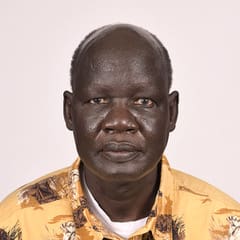Mediation in South Sudan, A Christian Perspective. Member Spotlight: James Ninrew Dong
James Ninrew Dong is a mediator in South Sudan. He is the Executive Director at Assistance Mission for Africa (AMA), a faith-based organization registered since 2002. He works directly on projects relevant to Gender and social justice, transitional justice, and national resource management. He stated that at the time of beginning the organization, Mediation was a clear gap. He said, “there was no organization working on Peace. Peacebuilding itself did not attract funding.” However, through partnership building and a vision for a platform, AMA was made possible. He stated, “Peace is not an equation. We are hoping to reconcile a sense of community in South Sudan for reconciliation by trying to lay the ground.”
3-part Mediation Philosophy
 James, early in his career, developed a three-part mediation philosophy:
James, early in his career, developed a three-part mediation philosophy:
- He believes in allowing others to lay out the mediation route.
- He recognizes that he is not the figure of all knowledge. He stated, “I give people time to educate me and gradually bring them on board. I make them co-facilitators.”
- He practices from a Christian-based approach when appropriate.
Among other Abrahamic religions, mediation has played a crucial role. In all three approaches, he has emphasized that people are willing to engage in self-determination, which is built from within. He stated, “Mediation is not a one-time activity. It needs understanding.”
Currently, James is engaged in two main projects. First, he is helping implement the UN security resolution for 1325, specifically focusing on Women, Peace, and Security He recognizes that in South Sudan, women, peace, and security have a central role, but they are missing from the decision-making table. Therefore, he is working on a forum that can help women participate in activities across all sectors. His second project is titled “Action Plan for Peace (APP)” where he uses the Christian approach in partnership with the South Sudan Council of Churches, Pax Netherlands, and the Dutch Ministry of Foreign Affairs. The approach involves; Advocacy, Neutral Forum, and Reconciliation/Trauma-Healing component. He continues to work with women in this capacity as well. Despite James identifying as male, he has built solid relationships and connections with his female colleagues. Though he works within the mediation sector within the larger organization, the heads of the departments are women. Therefore, when he facilitates, he is constantly in contact with women.
Mediation with Religious Leaders
James has a specialization in Mediation with religious leaders. He stated, “If religion comes through Peace, why don’t we have a common approach? Why do we differ?” He acknowledged that religions have their values but intersect significantly. In this process, he has learned that mediation skills require training but also field experience. According to James, “certain skills come as you go.” In South Sudan, these skills vary. He stated, “South Sudan is unique. It has its challenges and opportunities. However, that does not mean we are cut off from a tree. We are part of the global world.” Furthermore, he acknowledged that South Sudan itself is remarkably diverse. Thus, approaches towards Mediation could vary depending on the region, even within the same country.
James calling for Mediation was interrupted by the conflict and war in South Sudan. Nonetheless, when the peace agreement was made possible, he was able to pursue higher education. He ended up attending the Evangelical Theological Seminary in Cairo, Egypt. Though he reflected on his time abroad, he recognizes that we now live in a new normal. He stated, “things are not normal any longer, but still peace is needed and therefore, work towards peace will be even more demanding.” Therefore, he emphasizes that more people will and should be recruited for peacebuilders. He stated, “just like we need humanitarian workers, we also need peace workers to save the world.”
Neutrality is Essential
Though he has been mediating for the majority of his life, he stated, “Mediation is not an easy job because you enter with enthusiasm, but the results may vary. For instance, out of 10 mediation cases, you succeed in 2, but that is still progress.” For experts already in mediation and young people interested in entering the field, neutrality is essential. Once engaged in Mediation, one will know if they are successful if both mediation parties feel like they are siding with the other side. He stated, “at that point, you will know that you are doing a good job, especially if both sides are accusing you that you are siding with their respective party.”
Furthermore, if a person decided that you are not the mediator they want, do not feel discouraged. On the contrary, he advised that “you should give your full support to the person they have chosen as their mediator. Help them continue building that existing trust and do the work from the background because if that person successful, you are successful.”
Article by Elizabeth Gamarra, MBBI Writer
